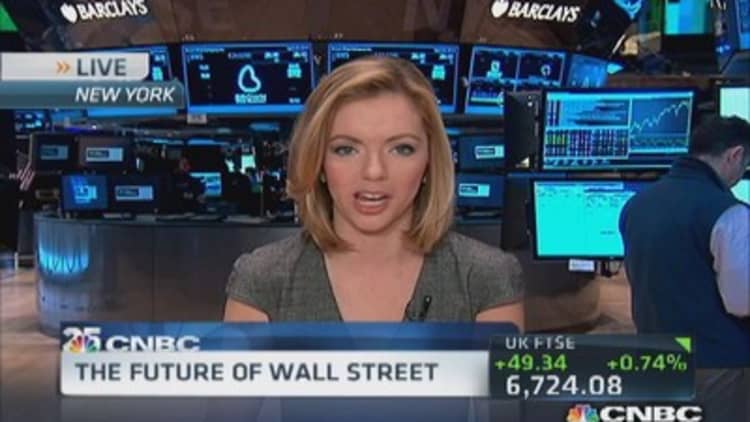
In the world of finance, the landscape is likely to be a lot different in 25 years than it is today. Here's a look at how things might shape up, and who the big players in banking will be, in order of importance.
Tie: Google, Facebook
Both Google and Facebook have made their intentions in the financial services space known and could use their technological prowess to upend traditional banking. Google's nascent effort is leveraging a debit-type card; Facebook will likely leverage its vast network when it secures a banking license in Europe next month.
Bank of America has the country's largest retail customer base, serving 49 million consumers and small businesses. Facebook has 1.28 billion monthly active users, and Google's numbers could be even higher:
Til Schuermann, partner at Oliver Wyman and former Federal Reserve official, said clients are more worried about Google than rival banks.
"Google is unencumbered by the old way of doing things, cognizant of new opportunities," he said.
Read MoreUnlocking the unbanked via mobile phones
The Blackstone Group
Blackstone has become one-stop shopping for many financial services.
Started in the 1980s as a traditional leveraged buyout firm, it now has nearly $200 billion in assets. It lends to small businesses, manages closed-end mutual funds, advises companies on takeovers—and as of recently, is the country's single-biggest owner of single-family homes.
Experts say seeing a Blackstone branch in your neighborhood isn't impossible.
PwC partner Dave Hoffman said that as banks get more regulated, competition will emerge from the shadows: "Private equity is looking for the niches where they can step in and fill in," he said.
Read MoreAmerica in 25 years: Here's what to expect
Visa, MasterCard, American Express
Credit card companies have an extremely valuable leg up in the future of commerce: Relationships with merchants.
Stores trust Visa, MasterCard and American Express technology and customer service, and consumers trust their brands, which have been around for decades. Now, they are taking their customer base onto new payments platforms, especially in the high-growth emerging markets where purchasing power is on the rise.
In fact, Visa has rolled out a no-card technology in India, where consumers can make verified transactions with just a fingerprint. American Express has also been eyeing the underbanked U.S. consumer with a prepaid "Bluebird" card offered at Wal-Mart.
David Wolman, author of "The End of Money," calls magnetic strips "despicably vulnerable" but said credit card companies have created staying power through technology.
"We're already seeing all of them pivot very quickly to mobile," he said.
Read MoreFinance kings: The bailouts, bonds and bubbles
Lending Club
Who knows your creditworthiness better: Your bank, or your friends?
In 25 years, borrowers will see social networks play a bigger role. Companies like Lending Club and Kiva have placed billions of dollars in loans, backed by individuals—peer-to-peer lending cutting out the Wall Street middleman altogether.
"Crowdfunded loans could be such a competitive threat to Wall Street banks (with tight lending standards), they could dip their toe into the space, too," she said. "The bank could say, if you crowdfund 50 percent of this loan, then we'll come up and we'll match the rest."
Read MoreMilken to Madoff: Villains who changed the world
Wall Street's money center banks
In 2039, Wall Street's banks will be more global in nature, but will scale back from the exotic operations they entered in the early aughts.
Regulation will still be stifling any risk-taking, forcing banks to focus on advising on deals, issuing stocks and bonds, and servicing corporate America.
As consumers flock to higher-tech bank accounts, it will be clear that the bulge-bracket (or broken-up investment) banks will return to their original niche, said James Malick, a partner at Boston Consulting Group.
"The role of a bank is intermediary: to provide liquidity, to grease the markets," he said. "That does not go away."
—By CNBC's Kayla Tausche.




